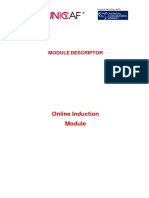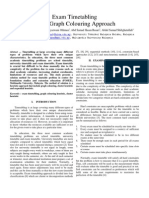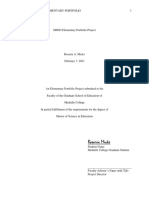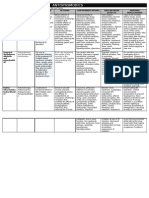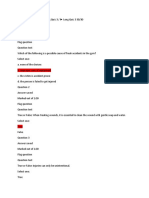Course Description:: Lifetime Physical Fitness and Wellness: A Personalized Program, (2015) by Hoeger and Hoeger
Course Description:: Lifetime Physical Fitness and Wellness: A Personalized Program, (2015) by Hoeger and Hoeger
Uploaded by
Raygin Bien OrtegaCopyright:
Available Formats
Course Description:: Lifetime Physical Fitness and Wellness: A Personalized Program, (2015) by Hoeger and Hoeger
Course Description:: Lifetime Physical Fitness and Wellness: A Personalized Program, (2015) by Hoeger and Hoeger
Uploaded by
Raygin Bien OrtegaOriginal Title
Copyright
Available Formats
Share this document
Did you find this document useful?
Is this content inappropriate?
Copyright:
Available Formats
Course Description:: Lifetime Physical Fitness and Wellness: A Personalized Program, (2015) by Hoeger and Hoeger
Course Description:: Lifetime Physical Fitness and Wellness: A Personalized Program, (2015) by Hoeger and Hoeger
Uploaded by
Raygin Bien OrtegaCopyright:
Available Formats
KHSC 333 MASTER SYLLABUS 1
Missouri Baptist University
KHSC 333: Health and Wellness
Master Syllabus
______________________________________________________________________________
Term:
Section:
Credit hours:
Campus:
Room:
Time:
Instructor:
Office:
Email:
Phone: Office - ###-###-#### Cell - ###-###-####
Office hours:
Course Description:
A survey of personal health including overviews of wellness concepts, including mental,
physical, social, emotional, vocational, and spiritual. Attention is given to community health
services and to school health and safety problems.
Prerequisite:
NA
Co-requisite:
NA
Required Text(s):
Lifetime Physical Fitness and Wellness: A Personalized Program, (2015) by Hoeger and Hoeger
(13 th ed.) Wadsworth, Cengage Learning
University Policies:
All students are responsible for the knowledge of and compliance with all university policies as
stated in the university catalog, graduate bulletin, and student handbook including but not limited
to grade appeal, computer use, copyright laws, and academic honesty and integrity.
Attendance: Attendance is mandatory for every exercise of a course in which a student is
enrolled. For students eligible for financial assistance, documented attendance is necessary
before the initial disbursement of funds to their student accounts. Documented attendance in
online classes will be determined by the completion of weekly class assignments. Students
failing to complete any required assignments in an online class during a given week may be
counted as absent for that week. Absence from class prevents a student from receiving the full
benefit of the course, and often detracts from the learning process for other students in the class.
Unless an absence is unavoidable, an absence may result in lower grades due to missed
examinations, assignments, exercises, and the failure to enter into the classroom learning
process. Unavoidable absences that qualify as excused absences, such as debilitating
CAD – Created SP16, Revised SP16 1
KHSC 333 MASTER SYLLABUS 2
illness/injury, university-sanctioned events, and personal emergencies, are defined in the
university catalog.
In the case of an unavoidable (excused) absence, a student may make up missed examinations
and assignments. It is the student’s responsibility to make arrangements with the instructor to
complete missed work in a timely fashion. Students are responsible for turning work in on time,
even if the student has an excused absence. Assignments turned in after two class periods may
not receive credit. In all other cases of absence, instructors are not required to allow students to
make up the missed work. Instructors may establish additional guidelines for their courses as
long as they are in accordance with division and official university attendance policies. After
two weeks of absences, students who incur any unexcused absences may have their final grades
lowered commensurately, which may include failure of the course. If students believe they have
received a course grade that is not reflective of the quality of their work, or their class
attendance, they should refer to the MBU Grade Appeal Policy in the MBU Undergraduate
Catalog or the MBU Graduate Bulletin.
Diversity: Missouri Baptist University is committed to maintaining a community that recognizes
and values the inherent worth and dignity of every person. Missouri Baptist University affirms
that an important part of the integration of faith and learning is the recognition that all people
are created in the image of God and worthy of respect and dignity. We seek to ensure that all
students have full access to the educational, social, and spiritual growth opportunities that the
University provides to ensure that students understand and appreciate one of the University’s
core values which is “social change through service and leadership.”
Through its curricula and classroom experiences, the university seeks to develop and nurture
diversity because it strengthens the organization, promotes creative problem solving, and
enriches us all.
The goal is to present materials and activities that are respectful of diverse groups
including, but not limited to, race, gender, color, national or ethnic origin, age, qualified
disability, military service, learning differences, or socioeconomic status.
Special Needs Access: Missouri Baptist University, in accordance with the Americans with
Disabilities Act of 1990, will provide reasonable accommodations for eligible students with
disabilities (e.g. attention, health, hearing, learning, mobility, physical, psychiatric, or vision). If
you have a disability that may have some impact on your work in this class and for which you
may require accommodations, please inform me immediately so that your learning needs may be
appropriately met. Students with a disability must register with the Special Needs Access Office
for disability verification and for determination of reasonable academic accommodations. You
are responsible for initiating arrangements for accommodations for tests and other assignments in
collaboration with the Special Needs Access Office and the faculty.
The Special Needs Access Office is located on the main campus in Field Academic Hall – Room
117. Special Needs Access Coordinator, can be reached at 314-681-3278.
CAD – Created SP16, Revised SP16 2
KHSC 333 MASTER SYLLABUS 3
Student Use of Email: In accordance with Missouri Baptist University (MBU) policy, every
student is required to have and to maintain an official MBU e-mail address. Some students may
elect to forward their e-mail to an address different from their official MBU email account. Any
student who elects to forward MBU e-mail to a different e-mail address assumes full
responsibility for reading e-mail at the forwarded location. Students are expected to check their
University e-mail account, or the account to which their University e-mail is forwarded, at least
twice a week.
Credit Hour Policy:
Missouri Baptist University requires this policy to be practiced by all faculty, full-time and
part-time. All definitions and standards apply equally to courses offered both on and off
campus.
The federally-approved regulation for a credit hour has been defined in two ways:
§ 600.2(1): The credit hour value of a standard or more traditional course must be
calculated as follows: A clock hour of instructional time is the equivalent
of (a) 50 minutes of class time or (b) 60 minutes of independent-study
work or some measures of clinical time; and (2) a minimum of two hours
of out-of- class work is expected for every hour (50 minutes) of
instructional time.
§ 600.2(2): If the credit hour value for an academic activity (including but not limited
to “laboratory work, internships, practica, and studio work”) cannot be
calculated using the information cited in § 600.2(1) (above), that academic
activity can be found to have met the federal definition by documenting that
it involves “at least an equivalent amount of work” as the criteria cited in §
600.2(1).
For example 1 credit hour equals 45 clock hours, 2 credit hours equal 90 clock hours,
3 credit hours equal 135 clock hours, 4 credit hours equals 180 clock hours.
MBU Policy Concerning Clery Act and Title IX
Missouri Baptist University (“Missouri Baptist” or “the University”) does not
discriminate on the basis of sex in its educational programs and sexual harassment and
sexual violence are types of sex discrimination. Other acts can also be forms of sex-based
discrimination and are also prohibited whether sexually based or not and include dating
violence, domestic violence, and stalking. As a result, the University issues this statement
of policy to inform the community of our comprehensive plan addressing sexual
misconduct, educational programs, and procedures that address sexual assault, domestic
violence, dating violence, and stalking, whether the incident occurs on or off campus and
when it is reported to a University official. In this context, the University prohibits the
offenses of domestic violence, dating violence, sexual assault and stalking and reaffirms
its commitment to maintain a campus environment emphasizing the dignity and worth of
all members of the university community. Details of this policy can be found at
www.mobap.edu/ASFSR
CAD – Created SP16, Revised SP16 3
KHSC 333 MASTER SYLLABUS 4
Academic Success Center - Writing Lab
In the Writing Lab, we believe you are a writer, and we treat your work as meaningful
scholarship. Meet one-on-one with a writing coach to have a conversation about your writing at
any part of your writing process and from any discipline.
Improve as a scholar, learner, and writer by receiving feedback on brainstorming, organization,
critical thinking, grammar and formatting choices, or anything related to your writing
assignment! We have a writing-as-thinking approach and will give you different perspectives on
your writing to apply to your writing process.
How to Make a Writing Lab Appointment (Main Campus Students)
The Writing Lab now accepts walk-ins, but we encourage you to make an appointment to
guarantee a time slot. Appointments can be scheduled for 30 minutes or 1 hour. Visit
http://mobap.mywconline.com/ to schedule an appointment online. You can also call 314-
392-2364, e-mail writing@mobap.edu, or stop by the ASC in FLD 117/119.
MBU Online Writing Lab (Regional Learning Center and Distance Learning
Students)
If you are a distance learning or extension site student, you are welcome to schedule a
face-to-face appointment, but you also have the opportunity to submit your paper online
to receive feedback from a writing coach.
Your essay does not have to be complete to send to the Writing Lab. We will respond to
paper ideas, paragraphs, half of a draft, or a full draft.
Visit http://www.mobap.edu/student-life/success/writing-lab/ and submit your paper by
using the online submission form. Depending on your paper’s length and the availability
of our writing coaches, your paper may take up to 72 hours (or 3 business days) to return
to you with feedback. You will receive an email with your paper attached as a Word
document. Additional questions should be directed to writing@mobap.edu or (314) 392-
2364.
Additional Writing Lab services include workshops, The Portable Writing Lab in the Perk
on Fridays from 1 - 3 p.m., and The Writing Space at
http://thembuwritingspace.wordpress.com/.
Please contact the Writing Lab for additional information on our resources and hours.
CAD – Created SP16, Revised SP16 4
KHSC 333 MASTER SYLLABUS 5
Instructor Specific Policies: (Use as needed for your course)
Academic Honesty and Integrity:
TURNITIN: Major assignments are submitted through Turnitin. By submitting your
assignments, you agree to have Turnitin software check the originality and intellectual integrity of
your work. You acknowledge and understand that upon submission, your paper will be added to
the Missouri Baptist University database and compared against a global database of submitted
papers. You further recognize that the determination of academic dishonesty rests with the
instructor of this course and that plagiarism will be dealt with according to the policy set forth in
the MBU Student Handbook.
Course Policies:
Course Learning Objectives:
engage in positive social interaction, learning and self-motivation.
state their personal philosophy regarding health and wellness practices.
list and describe the skill-related and health-related aspects of fitness.
identify and evaluate healthy and unhealthy behaviors relative to personal
health.
research current health topics to assist them in their pursuit of a healthier life
styles.
access and utilize web sites to reference topics of importance.
demonstrate an understanding of health knowledge by successfully completing
written examinations and lab assignments.
develop a comprehensive fitness program based on personal fitness goals.
Course Assignments, Projects, or Activities:
(Also see tentative schedule at end of syllabus)
Exams (20% of grade) There will be five (5) required TIMED examinations during the
semester (4% each). There will also be an OPTIONAL TIMED final comprehensive
exam offered at the end of the semester. If the student chooses to participate in the
final exam, his/her score on that test will replace the scores earned on the first five
exams (20%). The exams will cover content of the book, class notes, handouts, and
class discussion. Tentative exam schedules are listed on the course schedule. NOTE:
Tests MUST BE submitted by no later than 11:59 PM on Sunday after the week they
are posted in order for credit to be earned. It is the responsibility of the student to
make sure that online tests are submitted appropriately.
Health and Wellness Labs (26% of grade) A number of labs will be due throughout
the semester. The student will be responsible for completing each lab during the
week it is due and giving it to their instructor before or after class DURING THAT
WEEK. Labs turned in late will not be turned in for lab credit.
Worksheets (25% of grade) Online worksheets will be made available each week.
CAD – Created SP16, Revised SP16 5
KHSC 333 MASTER SYLLABUS 6
Students may retake the worksheet as many times as they wish during the course of
the week in which the worksheet is posted. If multiple attempts are made on
worksheets, the final worksheet submission will be the one accepted as a part of the
overall student's grade. NOTE: worksheets MUST BE turned in by no later than 11:59
PM on Sunday after the week they are posted in order for credit to be earned.
Class Participation (29% of grade) Student participation will be determined by (1)
attendance and (2) a goal setting assignment.
Additional Class Requirements
Students will participate in a goal setting exercise that includes each of the health-related
components of fitness (cardiovascular, flexibility, muscular strength, muscular endurance, body
composition). After completion of a pretest in each of the five health-related areas, students
will be assisted by their instructor in the creation of an appropriate goal in each health-related
area. The purpose of the post test at the end of the semester will be to determine students'
progress towards their health-related goals. Students will keep an online journal throughout
the project to track their progress. See grading rubrics for the Goal Setting Assignment and the
Goal Assignment Summary on Blackboard.
Learning Outcome Assessment Criteria
COURSE REQUIREMENTS: GRADING SCALE
Exams (5) 20% 90-100 A
Labs 26% 80-89 B
Worksheets 25% 70-79 C
Participation 29% 60-69 D
Final Exam (optional - can replace
20% 59 and below F
all previous test scores)
Bibliography
Allen, Mary Beth (2005) Sports, Exercise and Fitness. Libraries Unlimited
Allman, Toney (2010) Eating Disorders. Lucent
American College of Sports Medicine (2011) ACSM’s Complete Guide to Fitness and Health.
Human Kinetics
Birne, Emma Carlson (2007) Methamphetamine. Ref. Point Press
Blass, Elliott M. (2008) Obesity: Causes, Mechanisms, Prevention and Treatment. Sinauer
Associates
Campbell, T. Colin (2006) The China Study. BenBella Books
Corbin, Welk, Lindsey, and Corbin. Concepts of Fitness and Wellness. McGraw-Hill
Egendorf, Laura (2007) Sexually Transmitted Diseases. Greenhaven Press
Esselstyn, Caldwell B. (2007) Prevent and Reverse Heart Disease. Avery
Fuhrman, Joel (2011) Eat to Live. Little, Brown and Company
Hiber, Amanda (2006) Are American’s Overmedicated. Thomson/Gale
CAD – Created SP16, Revised SP16 6
KHSC 333 MASTER SYLLABUS 7
Hoyle, Brian (2006) AIDS/HIV. Thomson/Gale
Kiesbye, Stefan (2007) Steroids. Greenhaven Press
Latner, Janet D. (2007) Self-Help Approaches for Obesity and Eating Disorders. The Guilford
Press
McGill, Stuart (2007) Low Back Disorders: Evidence-based Prevention and Rehabilitation.
Human Kinetics
Nakaya, Andrea C. (2007) Marijuana. Reg. Point Press
Nesbit, Mark (2007) Performance Enhancing Drugs. Ref. Point Press
Pagano, Joan (2005) Strength Training for Women. Dorling Kindersley
Shannon, Joyce B. (2005) Thyroid Disorders Sourcebook. Omni Graphics
Wexlar, Barbara (2010) AIDS/HIV Gale Cengage Learning
Wexlar, Barbara (2011) Health and Wellness: Illness Among Americans. Thomson/Gale
Wexlar, Barbara (2011) Weight in America: Obesity, Eating Disorders… Thomson/Gale
Week 1 - Physical Fitness and Wellness
Resources for Review:
Textbook Chapter 1
Chapter 1 Outline
Chapter 1 PowerPoint Presentation
Chapter 1 Helpful Resources
Complete:
Lab Activity 1
Worksheet Chapter 1
Week 2 - Behavior Modification
Resources for Review:
Textbook Chapter 2
Chapter 2 Outline
Chapter 2 PowerPoint Presentation
Chapter 2 Helpful Resources
Complete:
Lab Activity Chapter 2
Worksheet Chapter 2
Week 3 - Comprehensive Fitness Programming
Resources for Review:
Textbook Chapter 9
Chapter 9 Outline
Chapter 9 PowerPoint Presentation
Chapter 9 Helpful Resources
Complete:
Goal Setting Assignment
Worksheet Chapter 9
Test 1 (Chapters 1, 2 & 9)
Week 4 - Cardiorespiratory Endurance
CAD – Created SP16, Revised SP16 7
KHSC 333 MASTER SYLLABUS 8
Resources for Review:
Textbook Chapter 6
Chapter 6 Outline
Chapter 6 PowerPoint Presentation
Chapter 6 Helpful Resources
Complete:
Lab Activity Chapter 6
Worksheet Chapter 6
Week 5 - Muscular Strength and Endurance
Resources for Review:
Textbook Chapter 7
Chapter 7 Outline
Chapter 7 PowerPoint Presentation
Chapter 7 Helpful Resources
Complete:
Lab Activity Chapter 7
Worksheet Chapter 7
Week 6 - Muscular Flexibility
Resources for Review:
Textbook Chapter 8
Chapter 8 Outline
Chapter 8 PowerPoint Presentation
Chapter 8 Helpful Resources
Complete:
Lab Activity Chapter 8
Worksheet Chapter 8
Test 2 (Chapters 6, 7 & 8)
Week 7 - Nutrition for Wellness
Resources for Review:
Textbook Chapter 3
Chapter 3 Outline
Chapter 3 PowerPoint Presentation
Chapter 3 Helpful Resources
Complete:
Lab Activity Chapter 3
Worksheet Chapter 3
Week 8 - Body Composition
Resources for Review:
Textbook Chapter 4
Chapter 4 Outline
Chapter 4 PowerPoint Presentation
CAD – Created SP16, Revised SP16 8
KHSC 333 MASTER SYLLABUS 9
Chapter 4 Helpful Resources
Complete:
Lab Activity Chapter 4
Worksheet Chapter 4
Week 9 - Weight Management
Resources for Review:
Textbook Chapter 5
Chapter 5 Outline
Chapter 5 PowerPoint Presentation
Chapter 5 Helpful Resources
Complete:
Lab Activity Chapter 5
Worksheet Chapter 5
Test 3 (Chapters 3, 4 & 5)
Week 10 - Preventing Cardiovascular Disease
Resources for Review:
Textbook Chapter 10
Chapter 10 Outline
Chapter 10 PowerPoint Presentation
Chapter 10 Helpful Resources
Complete:
Lab Activity Chapter 10
Worksheet Chapter 10
Week 11 - Cancer Prevention
Resources for Review:
Textbook Chapter 11
Chapter 11 Outline
Chapter 11 PowerPoint Presentation
Chapter 11 Helpful Resources
Complete:
Lab Activity Chapter 11
Worksheet Chapter 11
Week 12 - Stress Assessment and Management Techniques
Resources for Review:
Textbook Chapter 12
Chapter 12 Outline
Chapter 12 PowerPoint Presentation
Chapter 12 Helpful Resources
Complete:
Lab Activity Chapter 12
Worksheet Chapter 12
Test 4 (Chapters 10, 11 & 12)
CAD – Created SP16, Revised SP16 9
KHSC 333 MASTER SYLLABUS 10
Week 13 - Preventing Sexually Transmitted Infections
Resources for Review:
Textbook Chapter 14
Chapter 14 Outline
Chapter 14 PowerPoint Presentation
Chapter 14 Helpful Resources
Complete:
Goal Setting Assignment Summary
Worksheet Chapter 14
Week 14 - Addictive Behavior
Resources for Review:
Textbook Chapter 13
Chapter 13 Outline
Chapter 13 PowerPoint Presentation
Chapter 13 Helpful Resources
Complete:
Lab Activity Chapter 13
Worksheet Chapter 13
Week 15 - Lifetime Fitness and Wellness
Resources for Review:
Textbook Chapter 15
Chapter 15 Outline
Chapter 15 PowerPoint Presentation
Chapter 15 Helpful Resources
Complete:
Lab Activity Chapter 15
Worksheet Chapter 15
Test 5 (Chapters 13, 14 & 15)
Final Exam (optional)
CAD – Created SP16, Revised SP16 10
You might also like
- Edm 330 Assignment 3Document7 pagesEdm 330 Assignment 3baloyimaggie44No ratings yet
- Evidence Chart TemplateDocument11 pagesEvidence Chart Templateapi-667209011No ratings yet
- scn600 Consulting SarahltDocument11 pagesscn600 Consulting Sarahltapi-644817377No ratings yet
- Race, Geography, and Literary Landscapes LTEN 178/ETHN 168 T/TH 5:00-6:20 PM, Fall 2020Document6 pagesRace, Geography, and Literary Landscapes LTEN 178/ETHN 168 T/TH 5:00-6:20 PM, Fall 2020Calibán CatrileoNo ratings yet
- 490/590 Digital Rhetoric SyllabusDocument7 pages490/590 Digital Rhetoric SyllabuskathrynbcomerNo ratings yet
- The Kolb Learning StyleDocument72 pagesThe Kolb Learning StyleTs. Dr. Zulkifli Mohd SidiNo ratings yet
- HIST 201 Levey SyllabusDocument5 pagesHIST 201 Levey SyllabusMatthew StacyNo ratings yet
- Organizational Chart CritiqueDocument7 pagesOrganizational Chart Critiqueapi-666242639100% (1)
- Fostering Metacognition To SupportDocument7 pagesFostering Metacognition To SupportAnabel Espitia CamposNo ratings yet
- Alyssa Mcmahon Evidence Chart 2023Document8 pagesAlyssa Mcmahon Evidence Chart 2023api-565563202No ratings yet
- ED 501 Course SyllabusDocument9 pagesED 501 Course SyllabusBridgetNo ratings yet
- COMM 1010 F2F (Syllabus)Document5 pagesCOMM 1010 F2F (Syllabus)SteveHaslamNo ratings yet
- Scientific Method Teachers Guide Discovery EducationDocument31 pagesScientific Method Teachers Guide Discovery EducationKari Kristine Hoskins Barrera100% (1)
- Syllabus HSM 300 1 2Document21 pagesSyllabus HSM 300 1 2api-315592986No ratings yet
- Edci 638 Spring 2017 SyllabusDocument7 pagesEdci 638 Spring 2017 Syllabusapi-341716565No ratings yet
- Math 20-3 Lesson PlanDocument5 pagesMath 20-3 Lesson Planapi-2576722730% (1)
- Shaina Steingieser: Career ObjectiveDocument3 pagesShaina Steingieser: Career Objectiveapi-519730365No ratings yet
- IOE425 Syllabus Winter 2017 002 v1.1Document7 pagesIOE425 Syllabus Winter 2017 002 v1.1jstnjoseNo ratings yet
- Busn 702Document9 pagesBusn 702Pablo GuzmánNo ratings yet
- Wando Program of Studies 2019-2020Document167 pagesWando Program of Studies 2019-2020api-198607789No ratings yet
- James Waller Pme 832 - Theory in Practice AssignmentDocument6 pagesJames Waller Pme 832 - Theory in Practice Assignmentapi-450537948No ratings yet
- Syllabus For 2028Document2 pagesSyllabus For 2028echoxivNo ratings yet
- HSS2121.2015.Louise EdmondsDocument10 pagesHSS2121.2015.Louise EdmondskanchanNo ratings yet
- Grading GuidelinesDocument2 pagesGrading GuidelinesinforumdocsNo ratings yet
- Start Times Study SummaryDocument28 pagesStart Times Study SummaryinforumdocsNo ratings yet
- Jamie Brown EDAD 6193 Spring 2018 Dr. Bevers Leadership FrameworkDocument1 pageJamie Brown EDAD 6193 Spring 2018 Dr. Bevers Leadership Frameworkapi-405581818No ratings yet
- Gned 129 2012-04Document6 pagesGned 129 2012-04Patel HirenNo ratings yet
- UT Dallas Syllabus For cs6364.501.10s Taught by Haim Schweitzer (Haim)Document4 pagesUT Dallas Syllabus For cs6364.501.10s Taught by Haim Schweitzer (Haim)UT Dallas Provost's Technology GroupNo ratings yet
- Resit - 302BSS - Global Leadership Assn - 2019 - 20Document7 pagesResit - 302BSS - Global Leadership Assn - 2019 - 20Royford Wanyoike wamaithaNo ratings yet
- Assignment 8601Document24 pagesAssignment 8601arifiqra246100% (1)
- Pfo Assignment 3 2024Document6 pagesPfo Assignment 3 2024baloyimaggie44No ratings yet
- Systems ChangeDocument33 pagesSystems Changeapi-393899213No ratings yet
- Msed Portfolio Section ThreeDocument19 pagesMsed Portfolio Section Threeapi-519219936No ratings yet
- Py1103 SP53 2019Document17 pagesPy1103 SP53 2019shaniNo ratings yet
- MCT Report 1 MahraDocument4 pagesMCT Report 1 Mahramahra alshamsiNo ratings yet
- WK10 Assgn Benson ADocument7 pagesWK10 Assgn Benson AAspen Benson0% (1)
- Erg Guide Final - Aug 2023Document14 pagesErg Guide Final - Aug 2023harshadtembhurne8100% (1)
- LJMU The Online Induction Module Module Descriptor 1 PDFDocument10 pagesLJMU The Online Induction Module Module Descriptor 1 PDFRoderick FelixNo ratings yet
- Format Tugas Review Artikel BKDocument6 pagesFormat Tugas Review Artikel BKIka Maulidiyah RahmahNo ratings yet
- Grade 7 Health Unit: Personal Health: Incorporating The Alberta Information and Communication Technology CurriculumDocument21 pagesGrade 7 Health Unit: Personal Health: Incorporating The Alberta Information and Communication Technology Curriculumapi-288100428No ratings yet
- Assignment 2 - HBEF 3203Document4 pagesAssignment 2 - HBEF 3203Norhezrine OthmanNo ratings yet
- SSE Student Pledge 2022 2022 07 07 11 45 20Document2 pagesSSE Student Pledge 2022 2022 07 07 11 45 20Noak LabudaNo ratings yet
- Best Objective For ResumeDocument7 pagesBest Objective For Resumefsva0jkd100% (1)
- Exam Timetabling Using Graph Colouring Approach ICOCI 2011Document8 pagesExam Timetabling Using Graph Colouring Approach ICOCI 2011Rozilah Kamarudin100% (1)
- 2013 MBL911K Study ProgrammeDocument24 pages2013 MBL911K Study Programmeeugene123No ratings yet
- Syllabus ENC 1102Document11 pagesSyllabus ENC 1102Florence Margaret PaiseyNo ratings yet
- Letter To The Board Executive-2Document4 pagesLetter To The Board Executive-2Bob MackinNo ratings yet
- Edu693 Portfoliosection1 RosariamicksDocument28 pagesEdu693 Portfoliosection1 Rosariamicksapi-547416510No ratings yet
- UA OMSE Med/Ed Enews v3 No. 01 (AUG 2014)Document10 pagesUA OMSE Med/Ed Enews v3 No. 01 (AUG 2014)KC Spear Ellinwood, former Director Instructional DevelopmentNo ratings yet
- ENG 111-06 SyllabusDocument11 pagesENG 111-06 SyllabusNathan ConleyNo ratings yet
- 2014-2015 Online Catalog (Page 149) Business MGMNTDocument482 pages2014-2015 Online Catalog (Page 149) Business MGMNTElie Gilles Ravel MambouNo ratings yet
- EDU 603: Final Curriculum Project: Completing CVC WordsDocument18 pagesEDU 603: Final Curriculum Project: Completing CVC Wordslucygreene2018No ratings yet
- Rainnes Research PaperDocument13 pagesRainnes Research PaperKENNETH ANINZONo ratings yet
- Eastern Washington University Eagle Logo: and by Appointment, Zoom, Phone, Canvas Messaging and EmailDocument13 pagesEastern Washington University Eagle Logo: and by Appointment, Zoom, Phone, Canvas Messaging and EmailEmmeline McCarthyNo ratings yet
- Usf MSW CourseworkDocument4 pagesUsf MSW Courseworkkrdwiuvcf100% (2)
- CJ220 SyllabusDocument6 pagesCJ220 SyllabusFinn SpamNo ratings yet
- RA Class SyllabusDocument10 pagesRA Class SyllabusJon MerrillNo ratings yet
- BUS541A Fall 2019Document14 pagesBUS541A Fall 2019AnonymousNo ratings yet
- SylabusDocument21 pagesSylabusSardor Homroyev0% (1)
- HSV 524 Syllabus 7.30.19Document7 pagesHSV 524 Syllabus 7.30.19Mistor Dupois WilliamsNo ratings yet
- Was Michael Fink Standing His Ground? What Laws Are Strict For Firing A Weapon? Not For An Attorney in Florida, Are They ABOVE The LAW?Document8 pagesWas Michael Fink Standing His Ground? What Laws Are Strict For Firing A Weapon? Not For An Attorney in Florida, Are They ABOVE The LAW?legal_eagle1No ratings yet
- TheRawFoodDietandYourCompromisedTeeth PDFDocument117 pagesTheRawFoodDietandYourCompromisedTeeth PDFkiska888No ratings yet
- AntispasmodicsDocument2 pagesAntispasmodicskt16roxNo ratings yet
- Horse Hoof Care: A Guide To Your Horse's Hoof HealthDocument13 pagesHorse Hoof Care: A Guide To Your Horse's Hoof HealthLevi NicolleNo ratings yet
- 2020YIP SLE Winners ListV2Document29 pages2020YIP SLE Winners ListV2VISAKH K NAMBOODIRINo ratings yet
- Pilot Study On Antardhuma Rasasindura A Forgotten AmbrosiaDocument8 pagesPilot Study On Antardhuma Rasasindura A Forgotten AmbrosiaKrasimir GeorgievNo ratings yet
- Amputation Below KneeDocument1 pageAmputation Below KneeLisnainiMuchlisNo ratings yet
- Summary Notes - Topic 7 Human Nutrition - CIE Biology IGCSEDocument6 pagesSummary Notes - Topic 7 Human Nutrition - CIE Biology IGCSEImran MushtaqNo ratings yet
- Corolene 98S451Document2 pagesCorolene 98S451Phuc LeNo ratings yet
- Hemat MCQ PDFDocument84 pagesHemat MCQ PDFSangeeta Yadav100% (1)
- Introduction To Clinical HematologyDocument42 pagesIntroduction To Clinical HematologyBishoy GalalNo ratings yet
- Drug Study 2 de Guzman Miguel Paulo P. NCMHDocument2 pagesDrug Study 2 de Guzman Miguel Paulo P. NCMHMark Angelo SarmientoNo ratings yet
- Massochistic PersonalityDocument16 pagesMassochistic PersonalityTana Tan100% (1)
- Nama: Eka Nova Amanda Nur Saputri NIM: 030560069 Mata Kuliah: Semantics/ BING4317Document3 pagesNama: Eka Nova Amanda Nur Saputri NIM: 030560069 Mata Kuliah: Semantics/ BING4317tri naryanto33% (3)
- Ineffective Cerebral Tissue Perfusion Related To Interruption of Blood Flow Secondary To Hemorrhage As Evidenced by GCS of 7Document2 pagesIneffective Cerebral Tissue Perfusion Related To Interruption of Blood Flow Secondary To Hemorrhage As Evidenced by GCS of 7dana100% (4)
- Table of Contents IDocument4 pagesTable of Contents IWenceslao Ogahayon BaguioNo ratings yet
- GSSE: Scientific Writing 1: Scientific Language and ReadershipsDocument32 pagesGSSE: Scientific Writing 1: Scientific Language and ReadershipsOloviana ErnaNo ratings yet
- Telephone Training: MED-EL Worldwide HeadquartersDocument2 pagesTelephone Training: MED-EL Worldwide HeadquartersEdna Neri GuzmanNo ratings yet
- Peritonitis in PD PatientsDocument64 pagesPeritonitis in PD PatientsDaniel SitungkirNo ratings yet
- Xanthine Oxidase Inhibitory Activity of Vietnamese Medicinal PlantsDocument8 pagesXanthine Oxidase Inhibitory Activity of Vietnamese Medicinal PlantsRajesh KumarNo ratings yet
- Gpssb-Jr-Pharmacist-08-05-2022-2 ANSWERDocument6 pagesGpssb-Jr-Pharmacist-08-05-2022-2 ANSWERPratyush swarnkarNo ratings yet
- Introduction To Medical ImagingDocument2 pagesIntroduction To Medical ImagingmpenaNo ratings yet
- Long Quiz 3 PedhDocument11 pagesLong Quiz 3 Pedhapi-374915232No ratings yet
- Aiims Jodhpur Mega Test-13 (MSN-01)Document16 pagesAiims Jodhpur Mega Test-13 (MSN-01)ShrutiNo ratings yet
- University of Eastern PhilippinesDocument2 pagesUniversity of Eastern PhilippinesFlorante AnibanNo ratings yet
- Be 2Document105 pagesBe 2Nazia Gulzar100% (1)
- Degradation Process of Mycobacterium Leprae Cells in Infected Tissue Examined by The Freeze-Substitution Method in Electron MicrosDocument8 pagesDegradation Process of Mycobacterium Leprae Cells in Infected Tissue Examined by The Freeze-Substitution Method in Electron MicrosHafizArqursoyNo ratings yet
- Executive Intelligence Review: Britain's Dope, Inc.: Marker For Humanity's New Dark AgeDocument17 pagesExecutive Intelligence Review: Britain's Dope, Inc.: Marker For Humanity's New Dark AgeKnockoutratNo ratings yet
- Assissting FNAB in The Liver Liver Biopsy Checklist FinalDocument10 pagesAssissting FNAB in The Liver Liver Biopsy Checklist FinalCamille T. SanchezNo ratings yet
- Nebulization TherapyDocument2 pagesNebulization TherapySamantha Nicole MendozaNo ratings yet





































